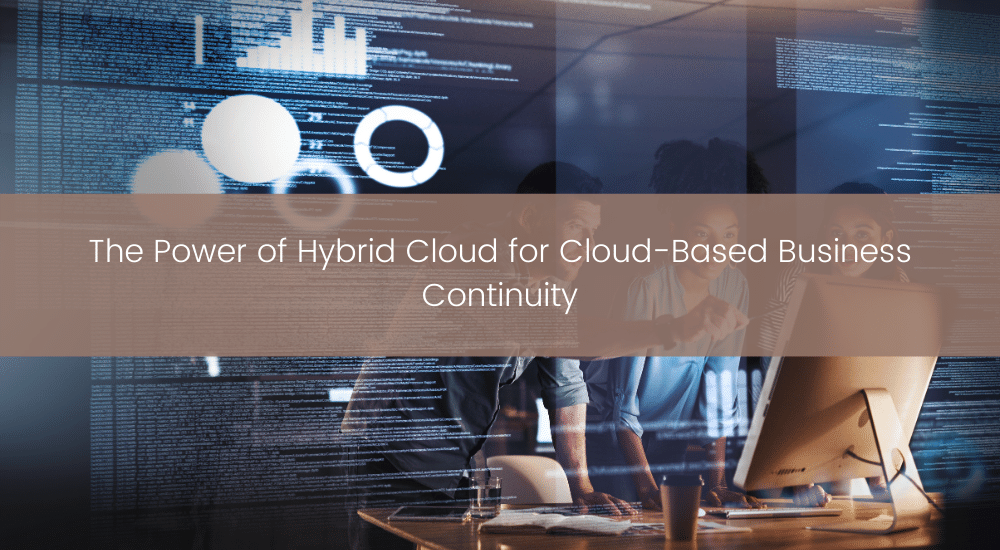
The year 2020 has seen massive amounts of disruption to the business world. As we look forward to 2021—we continue to experience an accelerated pace towards digitalization. Many industries began planning the adoption of cloud technologies and infrastructure before the pandemic’s impact required immediate action.
As a business leader, how did you react to potential disruptions? With a solid business continuity plan in place—companies can outline ‘what to do in case of a disaster’ scenarios, including roles, responsibilities, and disaster recovery actions lined up for a smooth transition to restarting business.
If your organization is like most, its business continuity plans or IT roadmaps did not include scope reflecting the entire duration or severity of the pandemic. Executives had to swiftly modify priorities in order to focus on survival and daily operations. With experience gained over the past quarters—we understand the need to leverage the cloud as an imperative of business modernization.
The Power of Hybrid Cloud
With the right people, processes, and technology in place, businesses could continue running using remote employment, while supporting customer demands without disruption, because they were already established in the cloud. Those wholly tied to legacy infrastructure experienced challenges of conducting business remotely by securing their distributed workforce and enabling online business as a source of inaction and costly delays.
Hybrid cloud in all its permutations supply the capabilities, agility, standardization, scalability and enhanced control needed for an enterprise to quickly develop, deploy and support digital features and services. -Karun Sorout for CIODive
Consider hybrid cloud as an organizational investment that can unlock technologies, enable growth, and maximize the ability to innovate. Through its multi-environment nature, businesses can have more choices to ensure a stable foundation for preparing for disasters. Even with limited hybrid cloud exposure—businesses can use Desktop as a Service, Backup as a Service, and Security Monitoring as a means of modernizing business. Hybrid Cloud remains an integral part of building a future-adaptable continuity plan capable of absorbing real crises.
Cloud Scalability
Businesses should not feel pressured to deploy all aspects of the hybrid cloud. Updating legacy infrastructures to modernized cloud technology can be a difficult undertaking to accomplish. The IDG 2020 Cloud Computing survey demonstrates uses up to 54% of applications in the cloud originating from on-premise legacy infrastructures.
Certain aspects of existing legacy infrastructures can be used within the cloud using orchestration between environments. As a single, evolving infrastructure used to run applications and workloads—it can be leveraged as an IT resource that can easily manage access, data, collaboration efforts, security, and patches remotely.
The hybrid cloud gives users a flexible platform to invest in growth without the commitment and investments related to on-premises hardware and additional IT personnel.
Gain Operational Efficiencies
Cloud environments can be used as any other service to help relieve the burden of support and maintenance. With the hybrid cloud, you can choose the features best suited for unique business needs—adjusting for variability demand over time.
Business expansion is easier as elements that run your business can be mapped, visible, and controllable. Existing IT capacities and technologies can be leveraged against future growth with interoperability between private and public clouds.
Improved visibility in the cloud helps broaden the awareness of how companies operate using maximized efficiencies by streamlining processes and delivery through central management. Servers, applications, and workloads can immensely benefit from cleaner data to guide growth.
Optimizing Your Business With Hybrid Cloud Architecture
Hybrid cloud will benefit your business when disaster strikes—giving you the agility to pivot without excessive latency or downtime. The benefits of moving to the cloud are not limited to cost efficiencies as hybrid cloud users enjoy the security, responsiveness, scalability, availability or cutting-edge technology. The speed of innovation can be delivered across the cloud platform.
Visibility into the network can be gained by maintaining a sense of control of applications, workloads, and deciding which environments are best for businesses. Understanding the basics of all applications helps to improve business continuity plans.
The hybrid cloud is a responsive environment that is able to keep pace with new trends, services, and cutting-edge technologies. It helps your business move through phases of research and development, product release, and delivery faster and more efficiently.
Securing Your Infrastructure
The most basic, fundamental element of businesses is maintaining a sense of security. Hybrid Cloud services can provide the infrastructure redundancy and data backup and protection necessary for cyber-attack survival.
Hybrid Cloud is a critical technology tool with security as an integral part of the system. Plans to incorporate or modernize parts of your legacy infrastructure into the cloud can help with storing, processing, and securing systems while retaining control of critical data on premise.
Evaluate your own IT security resources by understanding what can be performed in-house and what may be outsourced to managed service providers.
Ensuring Business Continuity
As the pandemic hit businesses using cloud technologies were able to pivot quickly by responding to changing demand and marketing availability as others in the industry remained in panic mode. The pandemic crisis highlighted the gaps and forced companies to expedite cloud adoption. Most have figured out best processes for current disruptions while preparing for the next crisis.
The next time your business is threatened you can utilize best practices established in your cloud-based business continuity plan to reduce the impact on business operations. As a plan that incorporates the features of the hybrid cloud with a singular approach to service or product delivery—devote the time necessary for drafting processes for clear communication to employees and customers. Practical guides can help resolve glitches in business delivery, infrastructure, supply availability, and employee health.
Many cloud centric businesses use their in-house IT, along with outsourced talent, to improve capacity and capability. TBConsulting offers solutions with specialization in IT systems, software, data storage options, security monitoring, and more. We work alongside your organization’s CIO and IT teams to help you manage workspace operations. TBC can provide the tools necessary to help your company thrive and succeed.
TBC identifies your systems, workloads, data storage, and applications within your digital environment. We provide fully managed solutions for companies looking to modernize their IT environments while alleviating the burden placed on in-house IT employees.
If you would like to learn more about how TBC can address current organizational needs, please schedule a 30-minute consultation with one of our security experts today!
.png)

